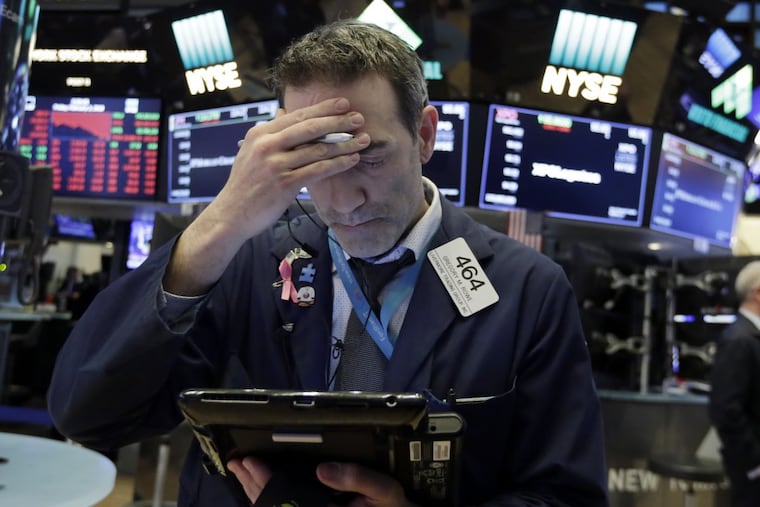The Fed didn’t cause the stock market carnage. President Trump’s ‘wrongheaded’ policies did
Moody's chief economist Mark Zandi argues that the President couldn’t be more wrong about his diagnosis of what ails the stock market. The problem isn’t the Fed, it's him.

The longest-running bull market in stocks is over. It ended on the day before Christmas, as the bellwether S&P 500 stock index slid 20 percent below its all-time high of just a few months ago. An eye-popping close to $6 trillion in stock wealth has evaporated.
President Donald Trump in a storm of tweets blames the Federal Reserve for the stock market’s comeuppance. The Fed has been slowly raising interest rates, which he argues is causing investors to sell. He is so mad about it that he has flirted with the idea of firing Fed Chairman Jerome Powell.
The president couldn’t be more wrong about his diagnosis of what ails the stock market. The problem isn’t the Fed, it is him. His economic policies are wrongheaded. Last year’s tax cuts juiced-up the economy, but they were paid for by a ballooning budget deficit, which is on track to increase to more than $1 trillion this fiscal year. With the Treasury borrowing hand over fist, it is no wonder interest rates are higher.
Trump’s decision to slash the corporate tax rate temporarily gave stock investors something to cheer about, but it hasn’t prompted a resurgence in business investment and sustainably stronger economic growth. Investment has flat-lined since the summer and growth has quickly fallen back.
Trump’s trade war is also giving investors lots of agita. For the last year, the president has picked fights with our trading partners, raising tariffs on a long list of imports. It is unclear to what end. The deal he struck with the European Union and the new NAFTA deal with Canada and Mexico are much ado about nothing. Little if anything changed from our previous trade arrangements with these allies.
Trade discussions have begun with China, but the same result seems likely. China is a problem – stealing intellectual property and inappropriately limiting access to their market – but stock investors are rightly skeptical that Trump’s bombastic tactics will solve it. Instead they have caused the Chinese economy, and by extension the entire global economy, to sputter. All publicly traded companies do lots of business overseas.
The president’s virulent stance against immigrants is also bad for business. Most companies’ number-one problem is finding workers to fill the record number of open job positions. Proverbial help-wanted signs are up for all types of workers across nearly all industries and parts of the country. With unemployment at a 50-year low and falling, only more immigrant workers can fill these jobs. But the president is making this impossible.
President Trump’s misplaced economic policies already had stock investors looking for the door, but given the political chaos he is creating they are now running through it. In just the last few days, he has attacked the Federal Reserve’s independence, cavalierly shut down parts of the federal government, and ushered out of his administration a string of senior officials and aides. Then there are the looming investigations into a long list of the president’s potential misdeeds that appear to be coming to a head.
Further fraying investors’ nerves was Treasury Secretary Steven Mnuchin’s ham-handed efforts to calm them. He issued a statement saying that he had conversations with the CEOs of the nation’s six largest banks, and that they assured him their institutions had the liquidity necessary to provide the credit that households and businesses require.
Really? Was that even a concern? Now it is.
To be sure, a correction in stock prices was long overdue. Prices had seemingly become disconnected from corporate earnings, particularly for high-flying technology stocks. The so-called FANG stocks, including Facebook, Amazon, Netflix and Google led the way, with their prices going parabolic.
However, this bear market is now way past a therapeutic revaluation in stock prices. If prices don’t soon claw back at least some of their decline, the loss of wealth will severely weaken consumer confidence and spending. The hit to the economy won’t by itself be enough to result in a recession, but it will slow growth enough that unemployment will start to increase.
Once unemployment rises, so too will recession risks as the economy will be vulnerable to anything else that goes wrong. Even with a steady hand in Washington, the world is full of risks. With President Trump at the helm, the world feels like a minefield.
Most of us shouldn’t look at the financial carnage in the stock market. Only half of Americans own stocks, and most of the other half should have a long-term investment horizon, which means preferably at least 10 years. The stock market will go up, down, and all around, but in the long run it is a very good investment, particularly compared with the alternatives including bonds, real estate, and certainly cash.
However, for baby boomers who are in or fast approaching retirement, this bear market is a wake-up call to slowly pare down their stockholdings. Perhaps not now in the teeth of the bear market, but at the earliest opportunity when prices begin to recover. Unfortunately, that will likely have to wait until the next president.
Mark Zandi is chief economist at Moody’s Analytics. Reach him at help@economy.com